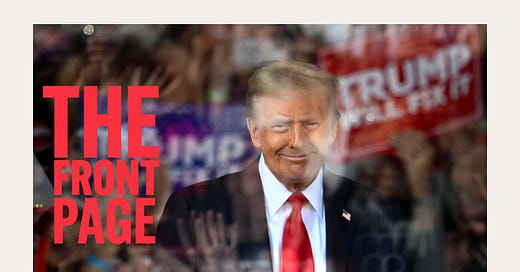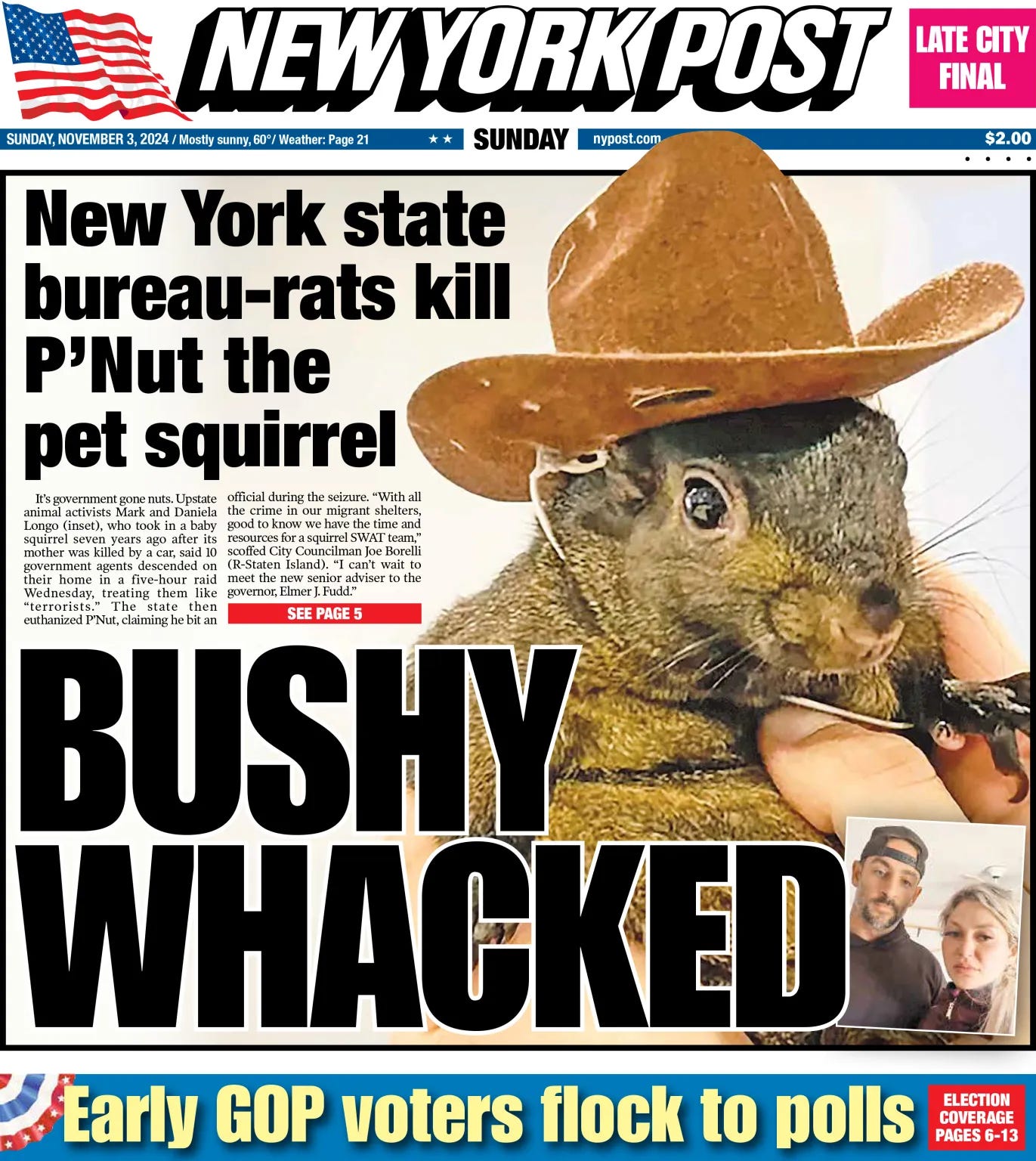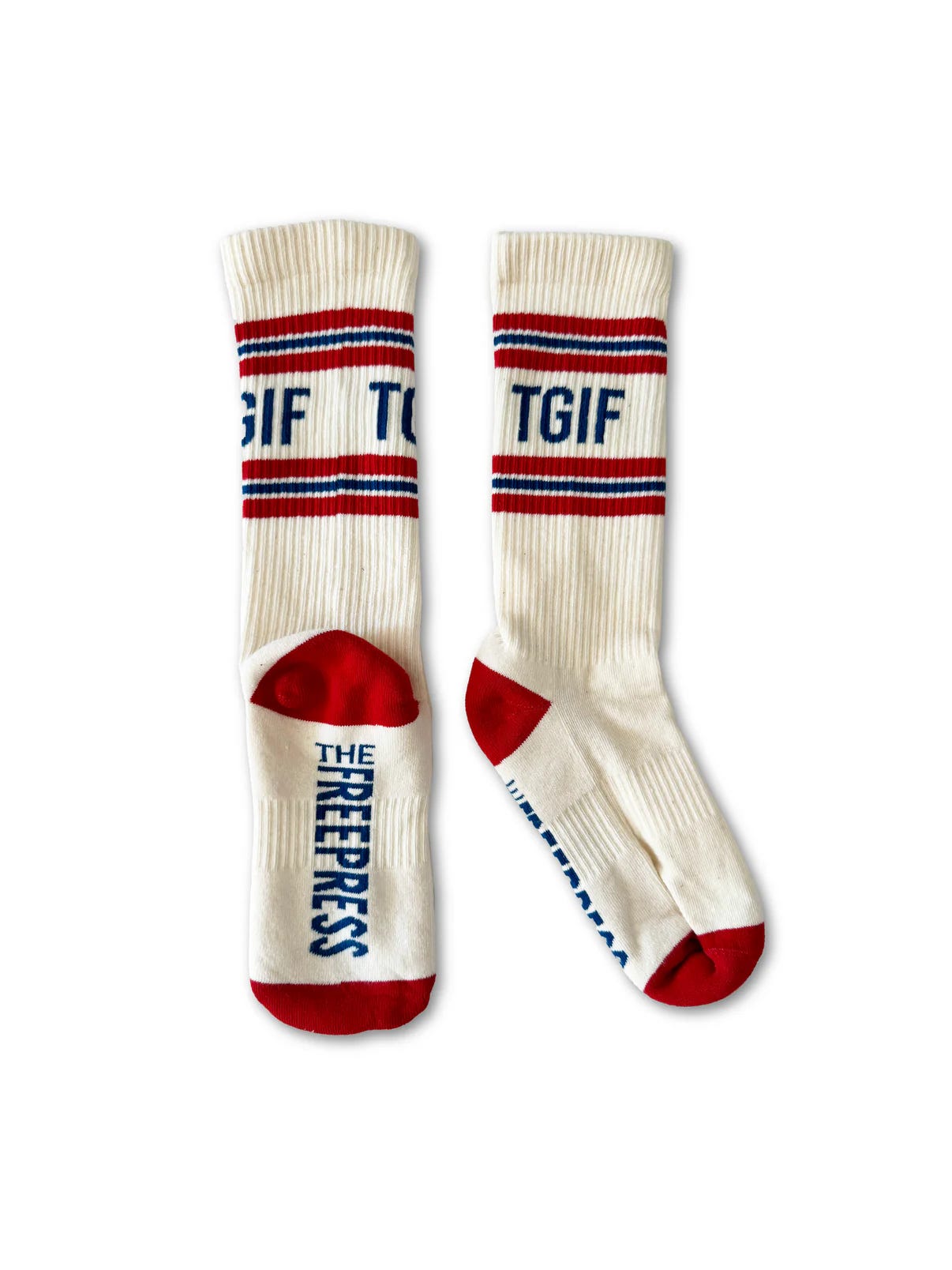
It’s Monday, November 4. The day before the election. This is The Front Page, your daily window into the world of The Free Press—and our take on the world at large. Coming up: the objects that define the campaign. Is Twitter real life now? AI’s pro-Harris bias. And more.
But first: Why anything could happen tomorrow.
Thank God it’s almost over.
If “garbage” didn’t push you over the edge, maybe it was Joe Biden, on the stump Saturday, saying that “Trump and his Republican friends” were “the kind of guys you like to smack in the ass.” Or Trump, at a rally in Pennsylvania on Sunday, saying he wouldn’t “mind” if someone had to “shoot through the fake news” to get to him. Enough already! Good riddance to this dishonest, violent, bad-tempered, and frequently idiotic race.
But no one likes a complainer, so enough kvetching. Here’s a more constructive thought before the big day and its aftermath: Don’t be surprised. If Trump wins. If Harris wins. Or if one of them wins decisively. And don’t be surprised if the election is decided by a hanging-chads–level photo finish that takes weeks to resolve.
On Saturday, a Des Moines Register/Mediacom Iowa Poll showed Harris three points ahead of Trump in Iowa. The poll grabbed headlines for two reasons: First and foremost because it showed Harris winning in deep-red Iowa, which Trump won by eight points last time. But also because it was conducted by J. Ann Selzer, who is seen as the best in the business and has polled Iowa with uncanny accuracy in recent years.
The poll has buoyant Democrats wondering if they might actually win Iowa. And it has everyone wondering: Are the other polls hugely underestimating support for Harris across the board? As Nate Silver put it, the “shocking” poll “means somebody is going to be wrong.” Outside of Selzer’s poll, the big picture on the polls is that it’s very close, both nationally and in the battleground states.
Nate is one of a growing number of polling experts who say that the polls this cycle are. . . suspicious. The pollsters are bunched a little too close together, and their survey results are a little too stable, nudging up or down by a point or two every week or month. The charge is that a lot of pollsters are “herding,” which basically means they are tinkering with their methodology to produce results that aren’t too dissimilar to their competitors’. In other words, they’ve decided to save face and be part of the pack that says “oh, it’s close!” rather than stick to their guns like Selzer.
The consequences are profound. It’s possible that the close polls are actually wildly apart, and their stability throughout the race—even among its crazy twists and turns—is really just a mirage.
Even if herding isn’t a factor, there are other reasons to doubt the polls. Pollsters have underestimated Trump’s support for two straight elections. This time around, they have made various methodological changes to try and fix the problem. But we don’t know if they’ve succeeded. Maybe they have. Or maybe they are still undercounting Trump’s support. Or maybe they have overcorrected, and they’re exaggerating his popularity?
What I do know is this: Anyone who offers you definitive predictions about this election isn’t being honest. The Times’ polling guru Nate Cohn showed admirable humility on X yesterday when he said: “I have no idea whether our polls (or any polls) will be ‘right,’ too good for Harris, or too good for Trump. No one does.”
Thankfully, we’ll soon find out. And if you’re surprised, don’t say I didn’t warn you.
Peanut the Squirrel and Seven More Symbols of This Election
On Saturday, I opened X after a few hours away from my phone and my feed was full of righteous anger about someone or something called “Peanut.” I soon discovered that they were talking about a squirrel who belonged to Mark Longo and his wife Daniela. The New York couple had opened up to TMZ about how the New York State Department of Environmental Conservation had taken their pet from them and euthanized it because it was a risk factor for rabies. Social media took the story and ran with it—at warp speed. Within a few short hours, Peanut was a conservative-coded cause célèbre. “Trump would have saved Peanut. We all know what Liz Cheney would have done,” tweeted David Sacks, in a post typical of the outrage. By Sunday, Peanut was on the front page of the New York Post: “Bushy Whacked,” read the headline.
It was a fitting controversy for the final weekend of this election, the most online and meme-heavy in history. And it reminded me of what Free Press columnist Katherine Boyle wrote a day earlier (on X, of course):
The real question of this election is this: online culture has always been upstream of offline politics and culture. And because of the gulf between online and offline, the Internet has never really determined downstream electoral results. Yes, Obama used the Internet. Yes, there were memes in 2016. But the discourse wasn’t dominated by internet culture.
This likely changed this year. This is the first millennial online candidate, the first online ticket with a hyper online team. Americans are more online than they have ever been before, and the culture travels faster to the mainstream.
The question is whether online and offline culture have finally merged in electoral politics. And if so, this is a truly historic election.
In other words, Twitter isn’t real life. Until it is.
That brings me to our next story today, “Seven Objects—And What They Say About the Election.” One good way to understand this election is to consider what’s gone viral over the past few months. The most viral image of the campaign was its most violent: Trump triumphantly punching the air in July after he nearly lost his life to an assassin. That gesture wasn’t just on the front page of every newspaper. It became an instant meme, adorning miniskirts, coffee cups, and balaclavas; supporters displayed it in their homes and tattooed it onto their bodies.
There were many other symbols of this election. Today, Free Press staffers pick the seven objects that sum up a very strange 2024 campaign. From the Trump Bible to Kamala’s coconut tree, read about all of them here.
And don’t forget to join us on election night for the Free Press live show, with a stellar lineup. From 7 p.m. until late. Forget cable news—hang out with us instead! Click here for more details.
Swing State Debates Series Finale: Talking the American Dream in Ohio
One thing I will miss about election season: Ben Kawaller’s Swing State Debates. Ben has traveled far and wide to host conversations on important issues. Thanks to Ben’s good-natured and empathetic moderation, the debates have—for the most part (looking at you, Florida)—generated more light than heat. No small thing in 2024.
For Ben’s series finale, he travels to Columbus, Ohio, to discuss the issue topping voters’ concerns: the economy. Watch below as Ben and Ohio voters—some pro-Trump, others pro-Harris, one undecided—debate which party most enables the American Dream. Read Ben’s dispatch on the Ohio debate here.
And catch up on the rest of his series here.
The AI Chatbots Are Rooting for Kamala
Much has been made of the tech bros moving right this election, but when it comes to the products they make, a left-wing bias seems clearer than ever. That’s the takeaway from Free Press reporter Madeleine Rowley’s investigation. She asked five of the biggest large language models whether Harris or Trump held better policies on the major issues of the election. What she found was a stunning degree of groupthink.
Read her full investigation here: “The AI Chatbots Are Rooting for Kamala.”

“We’ve made it all the way to the week of the election, and Kamala Harris’s campaign remains schtum on all manner of policy positions. Does the vice president still support an end to the death penalty? Getting rid of the Senate filibuster? A mandate for automakers to produce electric vehicles only by 2035? Axios’s Alex Thompson, who has been badgering Harris HQ for answers to these questions, lists all the queries Harris has stonewalled and labels her the “no comment” candidate.
As for the Trump campaign, what started as a disciplined, on-message operation ended up being something far more personal, more paranoid, and more chaotic, says a big new behind-the-scenes report by The Atlantic’s Tim Alberta. He writes that Trump contemplated debuting a new nickname for the president after he debated him in June: “Retarded Joe Biden.” Aides “pleaded” with Trump not to do it. (A campaign spokesman denies this.) He also reports that part of the reason Trump distanced himself from racist influencer Laura Loomer is that the former president “who is generally appalled by plastic surgery, was disgusted to learn about the apparent extent of Loomer’s facial alterations.”
No state is more important than Pennsylvania, which is why Harris will spend today barnstorming across the state, finishing with a concert and rally in Philadelphia. (The Swifties are wondering if their hero may make a cameo.) But Swift or no Swift, Pennsylvania-based reporter Salena Zito says Trump has more reason to feel good about the Keystone State than Harris.
Chinese spies can monitor your calls and texts. Josh Rogin reports that hackers have “burrowed inside the private wiretapping and surveillance system that American telecom companies built for the exclusive use of U.S. federal law enforcement agencies—and the U.S. government believes they likely continue to have access to the system.” File under: Can whoever wins tomorrow please fix this?
The clock is ticking but Slate has a buzzer-beater entry in the contest for worst article written about the election. Slate senior writer Scaachi Koul has delivered a column about J.D. Vance’s wife in which she expresses outrage that Usha Vance’s “allegiances are not to her race, her gender, the community she was born into.” Instead they are to her husband, notes Koul. Hear me out, but I think racial allegiance is bad, while allegiance to your spouse is good. Crazy, I know.
Sorry, Scaachi, I’m afraid you only get silver in the worst-article stakes. The top prize goes to Dave Zirin, who, writing for The Nation in August, warned Democrats that they were embracing football too enthusiastically. Sure, you win elections by distancing yourself from the most-watched sport in America and pretty much the only surviving part of the monoculture because it is “hypermasculine.” The embrace “could repel the young, left-wing voters more interested in policy changes than who wins the football wars.” Congratulations, Dave, on having the worst take of the election.
TGI Fridays has filed for bankruptcy. Its CEO blames Covid—which feels like a bit of a stretch in 2024—and says the chain is going nowhere, just restructuring. Of course, there’s only one TGIF in our hearts—and you can now show your love with TGIF-branded socks, which are back in stock in our merch store.
Oliver Wiseman is a writer and editor for The Free Press. Follow him on X @ollywiseman.
For more coverage of the 2024 election, click here.
You can support The Free Press by wearing TGIF socks—or by becoming a paid subscriber today:











Very telling that there’s no mention of the blatant FCC violation by Kamala and NBC. SNL knew it couldn’t have Kamala on this late in the campaign, then did it anyway. Will anything happen to NBC or the campaign? No. People are sick of the lawless, double standards, the thumbing their noses and saying, “what are you going to do about it, huh?”.
I gave up on the 'polling experts' in 2016. I've never been polled. I don't know anyone whose ever been polled. I don't know anyone who knows anyone whose ever been polled. Yes.....I know that's anecdotal, but whatever.....I still don't trust them. I know this isn't a poll, but the Amish normally don't vote. This year its expected that about 100,000 will turn out to vote in PA. Spoiler alert....they ain't voting for Harris. https://x.com/TONYxTWO/status/1853281777940353483
Now if you're ready to tune into some real entertainment, watch Jake Sullivans wife get absolutely eviscerated by Lily Tang Lee. If this doesn't put a smile on your face, then you're not human. https://x.com/ButteMTMc/status/1852434249003217220
I know a lot of people that subscribe to TFP aren't fans of Dave Smith b/c of his views on Israel and Palestine, but you simply can't dismiss this guy when it comes to how he drops truth bombs on the establishment like it's 1945 Dresden. Please take 3 minutes out of your day to listen to this. https://x.com/MAHAalliance/status/1852802883198112202
In a Washington Post Interview with Jonathan Capehart & Ruth Marcus, Hugh Hewitt stands up and walks out mid-interview after Capehart starts in with anti Trump rhetoric. Capehart and Marcus both look like someone just kicked their dog. It's pure gold. https://x.com/CollinRugg/status/1852380723329581296
When you go vote tomorrow, try to remember what these f*cking people did to you 4 years ago. This guy has probably never been out on a date thanks to the big pharma/big medicine psychopaths that brainwashed the poor bastard. https://x.com/Evans_Wroten/status/1852480602714292696
Speaking of COVID, the Health Board for the state of Idaho has completely removed the COVID vaccines from all of its clinics. Strange how this didn't make news with ANY of the main stream media outlets. https://x.com/MJTruthUltra/status/1851994438173700604
Imagine being so pathetic that you have to hide who you voted for from your spouse. Well the Harris campaign has released a series of ads wrapped around this concept. I mean seriously.......can you imagine being deceitful or secretive with your spouse over something like who you voted for? Of course I sometimes respond this way when my wife asks how much I paid for a new gun or lost at poker, but for voting???? I simply can't get my mind around this type of shit. https://x.com/bettyrohan/status/1852039503982047254
Nicole Shanahan's campaign video creation team is simply fantastic. Here is her latest drop. https://x.com/NicoleShanahan/status/1853116147341967534
Have a great Monday and don't forget. - You don't hate the media enough. You think you do, but you don't. https://x.com/Evans_Wroten